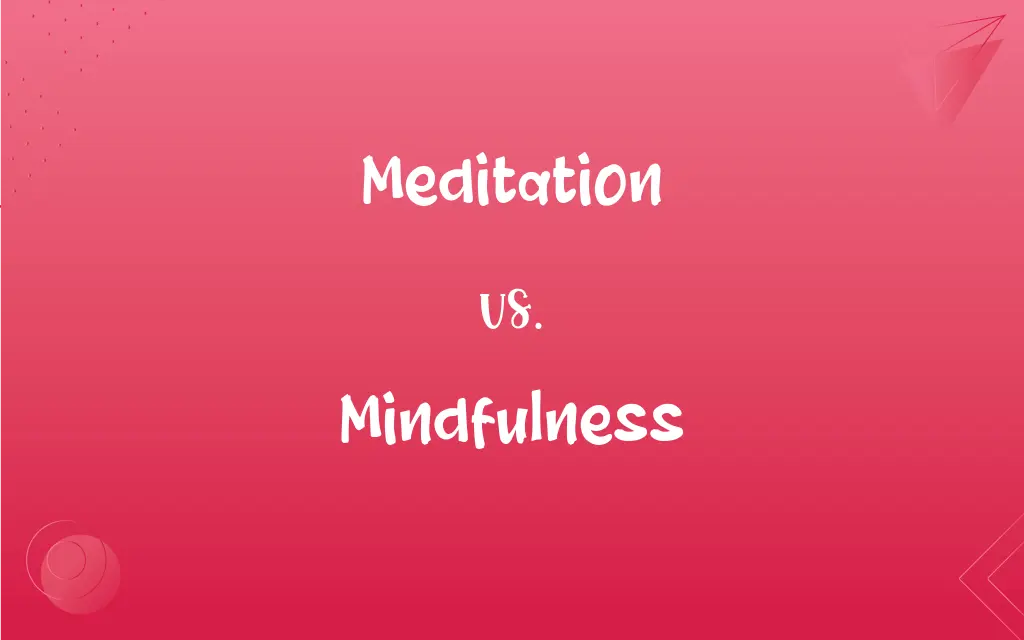Meditation vs. Mindfulness: What's the Difference?
Edited by Harlon Moss || By Janet White || Published on November 2, 2023
Meditation is a focused practice to achieve mental clarity and emotional calm, while Mindfulness is the continuous awareness of the present moment without judgment.

Key Differences
Meditation is a structured practice that individuals undertake to promote relaxation, build internal energy, and foster a particular mental state, like tranquility or focus. These sessions can vary in length and often involve specific postures, breathing techniques, or mantras. On the other hand, Mindfulness refers to the deliberate attention to the present moment and the ongoing acknowledgment of feelings, thoughts, and sensations without judgment.
While Meditation often requires setting aside dedicated time and can have various forms like transcendental, guided, or loving-kindness, Mindfulness can be practiced at any moment. This could be while eating, walking, or even during a mundane task. Essentially, it's about being fully engaged in whatever is happening, rather than being lost in thought.
The origin of Meditation traces back thousands of years and has roots in religious and spiritual traditions around the world. It's often viewed as a tool to achieve a higher state of consciousness or spiritual insight. Meanwhile, Mindfulness, though ancient, has been popularized in the West primarily through non-religious avenues, emphasizing its psychological and health benefits.
Incorporating both Meditation and Mindfulness into one's routine can yield significant benefits. Meditation can provide deep relaxation, mental clarity, and enhanced focus, while Mindfulness offers a greater sense of awareness, reduced stress, and improved emotional intelligence. Despite their distinctions, they are complementary practices that can enhance overall well-being.
Comparison Chart
Definition
A focused practice for mental clarity and emotional calm.
Continuous awareness of the present moment without judgment.
ADVERTISEMENT
Duration & Setting
Typically requires dedicated time and space.
Can be practiced anytime, anywhere.
Origin
Rooted in religious and spiritual traditions.
Ancient but popularized through non-religious means in the West.
Techniques
Involves postures, breathing techniques, or mantras.
Involves observing thoughts, feelings, and sensations.
Purpose
Achieve relaxation, energy build-up, specific mental states.
Enhance present moment awareness and acceptance.
Meditation and Mindfulness Definitions
Meditation
Meditation is a practice to achieve a state of deep peace.
She started her day with a 20-minute meditation session.
ADVERTISEMENT
Mindfulness
Mindfulness involves observing the present without judgment.
Through mindfulness, she learned to accept her thoughts without criticism.
Meditation
Meditation is a focused exercise to foster mental clarity.
Joining a meditation class helped him navigate his emotions better.
Mindfulness
Mindfulness is the quality of being present and engaged.
Practicing mindfulness, he began to enjoy his meals more.
Meditation
Meditation involves techniques to train attention and awareness.
Meditation has been an essential part of his stress-relief routine.
Mindfulness
Mindfulness means maintaining moment-by-moment awareness.
Mindfulness training improved her reactions to stressful situations.
Meditation
Meditation is the deliberate act of inducing a mode of consciousness.
Regular meditation has made her more attuned to her surroundings.
Mindfulness
Mindfulness centers on acknowledging feelings without reaction.
Embracing mindfulness, she became more tolerant and understanding.
Meditation
The act or process of meditating.
Mindfulness
Attentive; heedful
Always mindful of family responsibilities.
Meditation
A devotional exercise of or leading to contemplation.
Mindfulness
Awareness.
Meditation
A contemplative discourse, usually on a religious or philosophical subject.
Mindfulness
Inclination to be mindful or aware.
Meditation
A devotional exercise of, or leading to contemplation.
Mindfulness
Paying attention on purpose, in the present moment, and non-judgementally.
Meditation
A contemplative discourse, often on a religious or philosophical subject.
Mindfulness
A form of secular meditation practice with roots in Buddhist meditation.
Meditation
A musical theme treated in a meditative manner.
Mindfulness
The trait of staying aware of (paying close attention to) your responsibilities
Meditation
Careful and thorough thought.
Mindfulness
Mindfulness is the art of staying attuned to current experiences.
He applied mindfulness techniques to become a better listener.
Meditation
The act of meditating; close or continued thought; the turning or revolving of a subject in the mind; serious contemplation; reflection; musing.
Let the words of my mouth and the meditation of my heart be acceptable in thy sight.
Meditation
Thought; - without regard to kind.
With wings as swiftAs meditation or the thoughts of love.
Meditation
Continuous and profound contemplation or musing on a subject or series of subjects of a deep or abstruse nature;
The habit of meditation is the basis for all real knowledge
Meditation
(religion) contemplation of spiritual matters (usually on religious or philosophical subjects)
Meditation
Meditation is the discipline of turning inward to seek tranquility.
He found meditation to be an effective remedy for insomnia.
FAQs
What's the core difference between Meditation and Mindfulness?
Meditation is a structured practice for mental clarity, while Mindfulness is continuous present-moment awareness.
Can Mindfulness help in day-to-day activities?
Yes, Mindfulness can enhance everyday experiences and improve reactions to them.
Can Meditation and Mindfulness be practiced simultaneously?
Yes, mindfulness meditation is a form where one meditates with mindful awareness.
Is there a right or wrong way to practice Mindfulness?
The essence of Mindfulness is non-judgmental awareness, so it's more about the approach than a "right" method.
Is Meditation always religious or spiritual?
No, while rooted in religious traditions, many practice it secularly for its mental benefits.
How long should a Meditation session typically last?
It varies; some meditate for just a few minutes, while others might go on for an hour or more.
Can Meditation improve concentration?
Yes, consistent Meditation often leads to enhanced focus and concentration.
How does Mindfulness affect emotional health?
Mindfulness enhances emotional awareness and can improve emotional regulation.
Are there different types of Meditation?
Yes, including transcendental, guided, mindfulness, and more.
How can one start with Meditation?
Start with short sessions, focusing on breathing or a specific mantra, and consider guided sessions.
Can Mindfulness be practiced without meditation?
Yes, you can be mindful anytime, during any activity, without formal meditation.
How do I know if my Meditation practice is working?
Signs include increased peace, clarity, reduced stress, and enhanced self-awareness.
Can anyone practice Mindfulness?
Absolutely, Mindfulness can be integrated by anyone into their daily life.
How can I be more mindful in daily tasks?
By bringing full attention to them, acknowledging thoughts and feelings without getting lost in them.
Can Meditation help with anxiety?
Yes, many find Meditation effective in managing and reducing anxiety.
Is Mindfulness linked to Buddhist practices?
While it has roots in Buddhism, Mindfulness has been adapted in non-religious contexts too.
What's the role of breathing in Mindfulness?
Breathing is a common anchor in Mindfulness, helping to keep one centered in the present.
Can children be taught Meditation?
Yes, Meditation can be adapted for children, offering them tools to manage emotions and stress.
How does Mindfulness differ from mere concentration?
While both involve focus, Mindfulness is about non-judgmental awareness of the entire experience, not just a focal point.
Does Meditation require specific postures?
While certain postures can aid in Meditation, the key is comfort and stillness.
About Author
Written by
Janet WhiteJanet White has been an esteemed writer and blogger for Difference Wiki. Holding a Master's degree in Science and Medical Journalism from the prestigious Boston University, she has consistently demonstrated her expertise and passion for her field. When she's not immersed in her work, Janet relishes her time exercising, delving into a good book, and cherishing moments with friends and family.
Edited by
Harlon MossHarlon is a seasoned quality moderator and accomplished content writer for Difference Wiki. An alumnus of the prestigious University of California, he earned his degree in Computer Science. Leveraging his academic background, Harlon brings a meticulous and informed perspective to his work, ensuring content accuracy and excellence.






































































